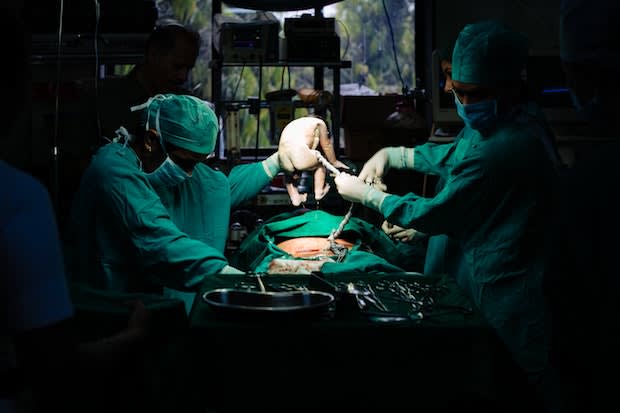Table of Contents
I. Beyond Typical Side Effects
III. High Fever and Muscle Contractions
VII. Talking to Your Anesthesiologist
Beyond Typical Side Effects
Anesthesia is widely used for performing various types of surgery. It helps to keep you sedated and pain-free during an operation. Before going under, your anesthesiologist will likely go over some common side effects that you may experience upon waking up. These side effects typically include nausea, vomiting, dry mouth, sore throat, and muscle aches. Other side effects you may experience include itching, shivering, and sleepiness. [1]
Because of how common these side effects are, there are many medications available to treat them. After surgery, you may be prescribed Transderm Scop (scopolamine) or Zofran (ondansetron) to assist with the side effects of anesthesia. In rare cases, anesthesia can cause cognitive dysfunction, hyperthermia, and breathing issues. [2]
General anesthesia ensures that you are unconscious during an operation. Although considered very safe, general anesthesia carries the most risk compared to local and regional anesthesia. Complications that stem from general anesthesia are rare, but there have been instances where it has caused post-operative delirium. Post-operative delirium is a cognitive dysfunction characterized by an altered state of consciousness that can lead to long-term memory and learning problems. [2] [3] A patient experiencing post-operative delirium is at risk of hurting themselves because they may tear open their bandages or stitches. Post-operative delirium can also cause patients to pose a threat to people around them as they may act on hallucinations and fear. [4] The risk of developing this cognitive dysfunction increases in patients who have heart disease, congestive heart failure, Parkinson’s disease, or Alzheimer’s disease. If you have had a stroke before, you may also be at risk. [2] General anesthesia may cause some patients to run a high fever and experience muscle contractions during an operation. This reaction to anesthesia is called malignant hyperthermia and is likely an inherited condition. [2] Malignant hyperthermia can cause a patient to reach dangerous body temperatures, exhibit muscle spasms, and experience a rapid heart rate. Without immediate treatment, malignant hyperthermia may be fatal. Before surgery, your anesthesiologist will likely ask if any of your family members have ever had a heat stroke or malignant hyperthermia. Genetic testing can also reveal whether you have the defective gene that puts you at risk. [5] Obstructive sleep apnea is a condition that causes you to stop breathing while you sleep. General anesthesia can be riskier for people who have obstructive sleep apnea because anesthesia can cause their throat to close during surgery. If this happens, you will find it more difficult to regain consciousness after surgery. [2] Losing control of the airway during surgery is a dangerous complication that can lead to loss of life, so make sure you tell your anesthesiologist if you have obstructive sleep apnea. [6] An incredibly rare complication of general anesthesia occurs when a patient is partially awake during a procedure. This experience is called unintended intraoperative awareness. It is estimated that one or two in every 1000 patients may be partially awake during general anesthesia, and even fewer experience pain. Anesthesia awareness can be traumatic because you will be unable to move or speak. Doctors will not know that you are awake or experiencing pain. Anesthesia awareness occurs so rarely that it is difficult to determine its cause. Possible factors may include insufficient anesthesia dose, daily alcohol use, depression, and heart or lung problems. If this unlikely complication does occur, you may want to seek help because anesthesia awareness may cause long-term psychological problems similar to post-traumatic stress disorder (PTSD). [7] Complications that arise from local or regional anesthesia are typically minor. Local anesthesia only numbs the area of the body undergoing a procedure, and regional anesthesia numbs a larger part of the body like the waist down, but both carry fewer risks than general anesthesia because they do not cause complete unconsciousness. Even so, if a needle is inserted in the chest area, a collapsed lung may occur. Regional anesthesia has also been known to cause nerve damage. [2] Learning about these complications of anesthesia can be scary. Severe complications may leave debilitating effects and can sometimes be fatal. But modern science has made many advances with anesthesia that make it safe and essential for many procedures. By talking to your anesthesiologist before and after surgery, you can significantly reduce your risk of complications. Disclosing your health conditions, medical history, and family history enables your anesthesiologist to make the most informed decisions regarding your procedure. The content in this article is intended for informational purposes only. This website does not provide medical advice. In all circumstances, you should always seek the advice of your physician and/or other qualified health professionals(s) for drug, medical condition, or treatment advice. The content provided on this website is not a substitute for professional medical advice, diagnosis, or treatment.
Cognitive Dysfunction
High Fever and Muscle Contractions
Breathing Problems

Anesthesia Awareness
Other Complications

Talking to Your Anesthesiologist
